In San Antonio, they are known as the leaders who get the job done. If you have a professional or
community need, just go to one of these women, and they will either help or point you in the right direction.
They are forging community partnerships, connecting people who need to be connected and helping individuals and organizations to find new opportunities. These women are game changers in our community in many ways.
Bonnie Prosser Elder
Bonnie Prosser Elder has been involved in community service since she was a child. Her mother was a member of Jack & Jill of America, an organization of mothers “dedicated to nurturing future African-American leaders by strengthening children through leadership development, volunteer service, philanthropic giving and civic duty.” The young Bonnie clearly took all of that to heart. Today, she is the general counsel and VP of the legal department at VIA Metropolitan Transit and an extraordinary volunteer who is always willing to lend a helping hand.
On the job, she is responsible for the oversight and coordination of all legal services for the organization that operates a fleet of 475 buses on 93 bus lines covering a service area of 1,226 square miles. Her responsibilities include the risk management and claims section as well as all legal issues that may come up with the expansion of services and general legal support for all other departments. When VIA starts implementing its long-range plan, Vision 2040, which envisions a multi-modal transportation system for a growing population, the legal group expects to get very busy.
Elder’s community involvement starts with professional organizations such as chairing the American Public Transit Association Legal Affairs Committee but extends well beyond that. She is the current or former member of a number of organizations, including, of course, the one she grew up in, Jack & Jill. Once she became a mother, she followed in her own mother’s footsteps, raising her daughter to be aware of community needs. She is also a member of the local chapter of Links, Inc., another national and international service organization of prominent women.
“Most of my volunteer work is in support of children,” said Elder. “For instance, the Links members work with the East Side branch of the Boys & Girls Club to expose children to the arts, introduce them to civic engagement, teach them about bullying and lots of other issues. There’s a program every week. We also raise money for scholarships to St. Philip’s College. This year, I am the chair of the fundraising gala, and I also chair the ethics committee, and we all spend time with the children at the club.”
She was also in the first group of black women to join the local Junior League more than 15 years ago, and largely thanks to their presence, the League started working with the Davis Scott YMCA — across the street from her East Side high school — and the Miller Child Development Center, also in that area. “I am pretty sure the Junior League had never done that before,” she noted. “You know, in the world of nonprofits money is important, but what is also very important is putting warm bodies, hands and hearts into the community, and the Junior League does that very well.”
At the time, Elder was aware that she was a pioneer of sorts as she and a few others brought diversity to the previously rather uniformly white women’s organization. And there were lots of similar firsts in her life. Teenage Bonnie was the first black twirler in her high school, and she became the first woman and the first black person to attend a meeting of the American Public Transit Association Legal Affair Committee when her then-boss at VIA took her with him to the gathering. In addition, she is the only black woman to attain the position that she holds with a major transit agency in Texas.
Little wonder that diversity issues have become a big part of her thinking and community involvement across the board. With her sister, she has volunteered to help her alma mater, UT Austin’s, outreach into minority communities. This is something she doesn’t even include in her CV, but it’s an extremely important task.
“There are so many talented young people graduating from high school who don’t think that they can get into UT, let alone get a scholarship. Nobody’s told them what to do. UT did a big outreach event here, and we did more specific outreach to certain schools,” she says.
Though she doesn’t formally represent VIA through her community work, she says, “It’s hard for me to be in a place without in some way representing VIA since I have been here so long.” In fact, her entire post-law school career has been with VIA. She is often invited to speak on a variety of issues, and all sorts of people call her for all sorts of help. If someone’s child wants to go to law school, she’s happy to take the kid to lunch and mentor him or her. If someone else calls needing a VIA ID or information or looking for a job — not necessarily with VIA — she puts them in touch with someone who can help. Not long ago, her former music teacher asked her to read to her students during Black History Month, and Elder said yes. “People know me and they call. Sometimes they would say, ‘Mrs. So-and-so suggested I call you…’ We are still connected as a community. I always try to help.”
Mary DeLay
When you walk into Mary DeLay’s office at the UT Health Science Center (UTHSC), you can’t fail to notice a large treadmill positioned along one wall. The VP and chief of staff for the school’s president, Dr. William Henrich, DeLay uses the machine to relieve back discomfort as she works. “I’ve mastered the skill of typing while walking at the speed of 1.8 miles/hour,” she explained. Now she alternates between her regular desk and the treadmill one.
The treadmill says something about this hard-working woman who is not about to let back pain slow her down. DeLay joined UTHSC 27 years ago as its first director of development and alumni relations under President John Howe, M.D., staying and prospering through the presidencies of Dr. Francisco Cigarroa and now Dr. Henrich. As chief of staff, she works closely with the president to provide administrative, organizational and planning support for the president’s vision and initiatives, oversees the running of the president’s office and administers a community engagement program.
“I am the stepping stone to the president, who gets requests every day from a wide range of people to collaborate on projects, to speak at meetings, and all sorts of requests. It is my job to make those connections and to help. I’ve been here so long, lots of community folks already know me,” noted DeLay, who has an easy, pleasant manner about her. And sometimes it’s more than making connections. Not long ago, Dr. Henrich was approached by Renée Flores, the 2016 chair of the Greater San Antonio Chamber of Commerce, who wanted to explore ways to make San Antonio’s key industries even better. She called the initiative “Good to Great to Global,” and asked Dr. Henrich to chair the task force on health care and biosciences. The latter is a $30.6 billion sector that employs one of every six people locally.
DeLay handled the logistics of the entire project, helping to form Dr. Henrich’s committee by suggesting representatives from other scientific institutions in town and actively participating in the formulation of a proposal on how to move toward “great” and “global.” Needless to say, she is very knowledgeable about biomed issues and resources in San Antonio.
Her duties may also involve facilitating the interviewing process for a new director of the UT Health Cancer Center, arranging high-level meetings and representing UTHSC on the Greater Chamber’s board.
In addition, DeLay runs the community engagement program on her own. The Health Science Center partners with a large number of nonprofits and businesses in the city. She is in charge of the United Way-administered State Employee Charitable Campaign (SECC) for the university and the allocation of the collected funds, which mostly go to health-related organizations, such as the Heart Association or the Diabetes Society. She tries to be evenhanded and allocate the limited funds fairly. Some of the monies are returned to the health schools in the form of research grants, which deepen the collaborative relationships and benefits a broader cause. And if you need a doctor, you can also call her office, and they’ll find you one among their stellar physicians.
“I love my job,” said DeLay. “I have worked with some incredible leaders who taught me a lot, leaders with a heart who want to help the community as well as UTHSC. I, too, find that rewarding. Every day I feel like I am going to do something to connect people who need to be connected. I feel like I am a partner to Dr. Henrich in a lot of things.”
Married for 23 years to businessman Alan DeLay, with four kids between them – one of whom is her adult son – she finds time for her step-grandkids and will soon become a grandmother of twins. Yet amazingly, she still has energy left over for more community work. On her own, DeLay is part of the United Way Women’s Leadership Council, which provides child care scholarships for parents wanting to return to school, as well as a “zone ambassador” for Leadership Women Inc., a Dallas-based organization that trains women to become active leaders. At the time of our interview, she was preparing to host an event for the program’s local alumnae: “I believe in their cause. I went through the program in 2002. We need women who want to make a difference in their community.”
Cynthia Teniente Matson
When she came back to San Antonio in 2015, Cynthia Teniente Matson hit the ground running. As the second president of Texas A&M University-San Antonio, she started building an ambitious program of growth for the school, with an eye on how to benefit not only the school but the wider community as well. Merely two years later, she is one of the most visible women leaders in the city.
“San Antonio is a big part of my life,” said the San Antonio native, who left her birthplace when she was 8.
“Now that I am the president of Texas A&M-SA and realize the impact that the university can make in the city, I am feeling very connected to my roots and San Antonio.”
Matson presides over a beautiful campus on the southern edge of the city that currently has 5,500 students, the majority of whom are Hispanic and female. Many are the first in their family to attend college, and a good number are working adults. About 17 percent are affiliated with the military. The school offers 25 undergraduate majors and 11 graduate programs. Under her leadership, A&M-SA has finally become a four-year college, after being an upper-division-only institution since 2009. It welcomed its first freshman class in the fall of 2016. What attracted her to the job, she said, was the opportunity to shape the educational future of a university “with A&M excellence.”
Currently, new buildings are being built – including the first dormitory; more students are enrolling; and new programs that will serve the needs of the community are being developed, among them water resources management, cyber sciences and computer engineering. “Public universities are called Stewards of Place,” she explained, “and that means we have a responsibility toward our community. Texas A&M-SA is mentioned in the SA Tomorrow plan as an engine of economic growth in this area. We are preparing students to meet the needs of the employers in the fast-changing job market.”
To that end, she has also founded the Center for Experiential Learning and Community Engagement that develops partnerships with other local institutions, which then offer students real-life avenues to enhance learning by doing. Community service, internships, civic engagement and service learning are all facilitated by the center. One recent example was the help communication students provided on the PR campaign for the Guadalupe Cultural Arts Center’s film festival. Another group of students under the leadership of Professor Megan Wise de Valdez is surveying the population of mosquitoes that carry the Zika virus. This project is a collaboration with Metro Health, other entities, and volunteer homeowners on whose properties the mosquito traps are placed.
The university is reaching out in other ways as well. In partnership with Bexar County, it has established an archival library in a downtown building, which received publicity not long ago when it agreed to house and take care of the historical book collection of the Daughters of the Republic of Texas. At present, there are several other collections in the vaults, noted the president, indicating that she was interested in providing this service for others in the community as well.
Matson personally follows the example she has set up for the school. Asked if she saw herself as a “go-to” person in the community, she said, Yes, anyone can contact her. With active social media accounts, which she checks regularly, she is very accessible to students, colleagues and other San Antonians. She serves on a number of local and higher-education boards and committees. As a United Way board member, Matson oversees the organization’s campus campaign, and she participates in the work of Women’s Leadership Council, the same group that Mary Delay talked about. When District 4 councilman Rey Saldana approached her about serving on the city tricentennial commission, she obliged.
And former Mayor Ivy Taylor tapped her to help with My Brother’s Keeper, a national initiative started by President Obama to help boys and men of color to achieve their potential by staying in school and graduating. In addition, Matson plays an active role with national higher education bodies, including the American Association of State Colleges and Universities’ task force in charge of putting together a study on the impact of partnerships, something at which she’s clearly an expert.
Married to Mike Matson, the president is the mother of two young adult sons, one of whom stayed in California, where the family lived before 2015, while the younger one is a student at A&M-SA. While in California, she worked as the VP of administration and chief financial officer for the California State University-Fresno. Given her heavy work and volunteer load, how does she recharge her batteries, we wondered.
“I enjoy being out at community events, and I enjoy exercising. Cycling along the Mission Reach of the River Walk is so relaxing,” said the trim, chic executive. “There’s such serenity there; It’s time I spend by myself, time for thinking.”
By Jasmina Wellinghoff
Photography by Martin Waddy


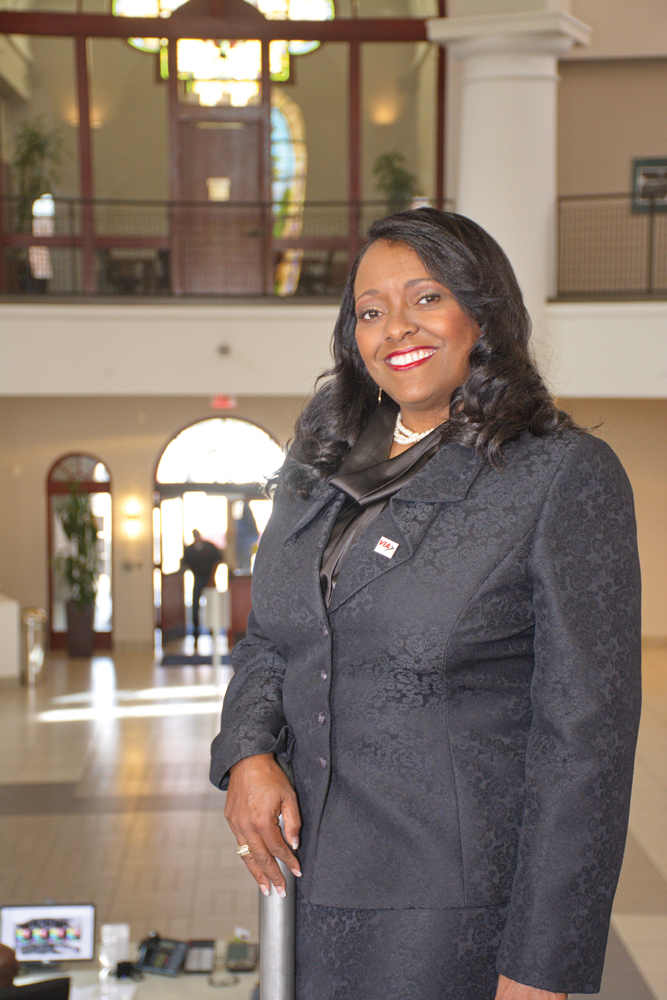
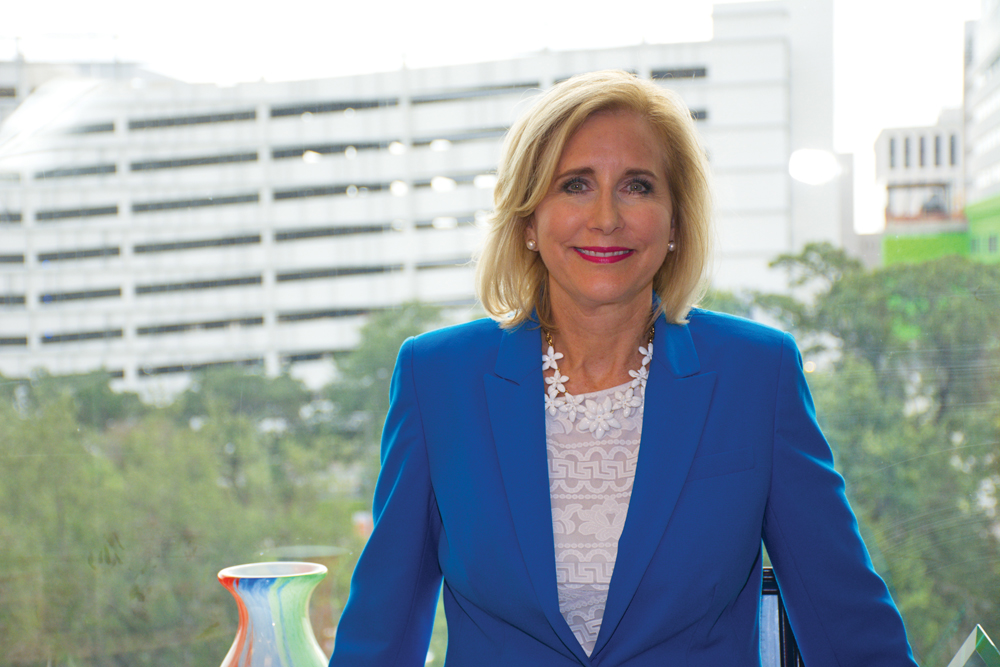
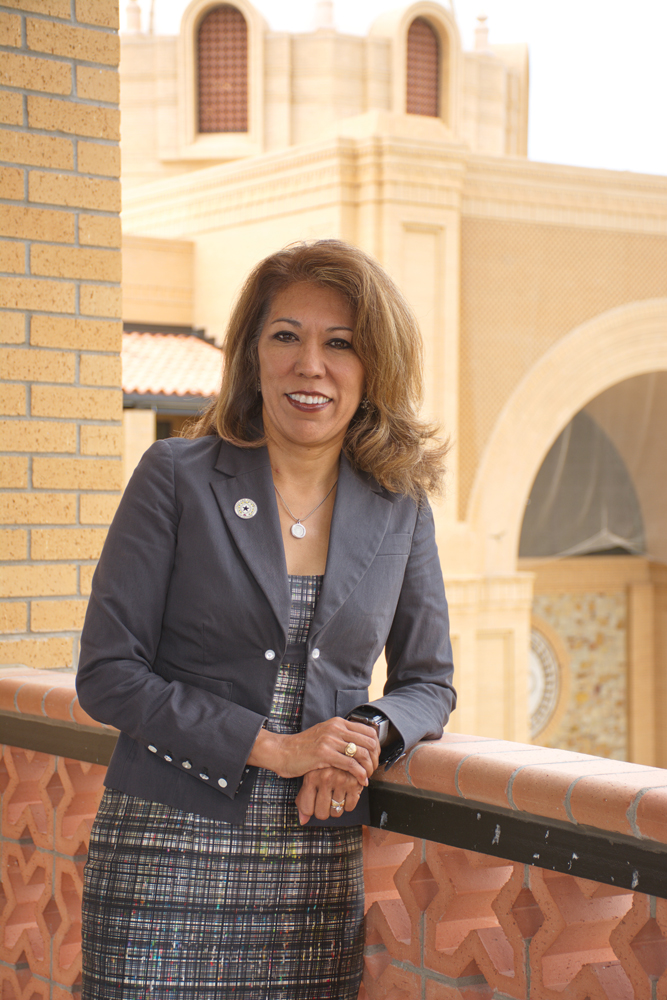




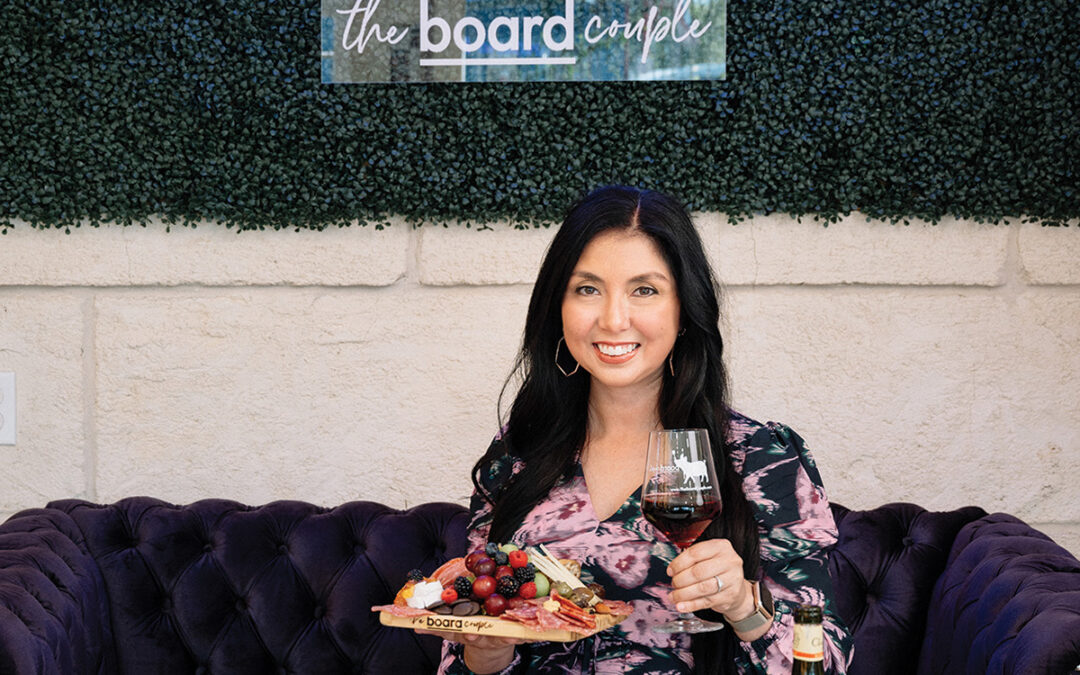

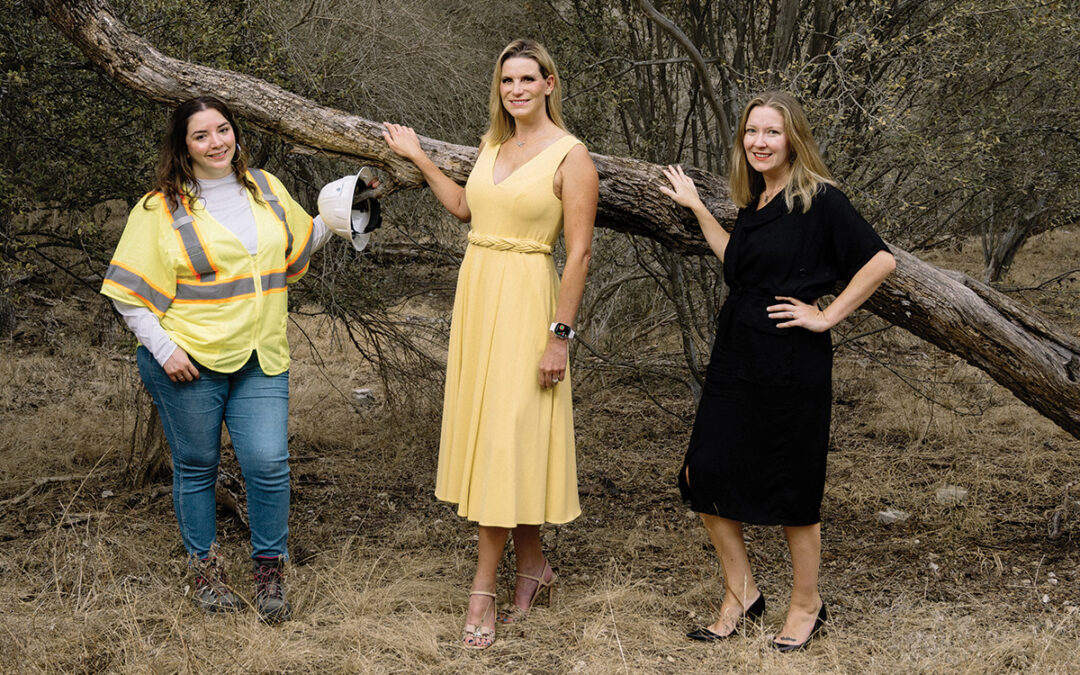
0 Comments